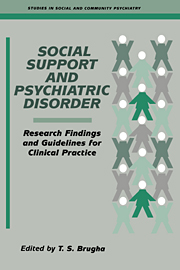Book contents
- Frontmatter
- Contents
- Preface
- List of contributors
- 1 Social support and psychiatric disorder: overview of evidence
- PART I CONCEPTS AND ORIGINS OF SOCIAL SUPPORT
- PART II LESSONS FROM SELECTED OBSERVATIONAL STUDIES
- PART III LESSONS FROM INTERVENTION STUDIES
- 9 Social network and mental health: an intervention study
- 10 A test of the social support hypothesis
- 11 Case management and network enhancement of the long-term mentally ill
- 12 Expressed Emotion: measurement, intervention and training issues
- PART IV INTERVENTION PRINCIPLES AND RECOMMENDATIONS
- Index
10 - A test of the social support hypothesis
from PART III - LESSONS FROM INTERVENTION STUDIES
Published online by Cambridge University Press: 31 October 2009
- Frontmatter
- Contents
- Preface
- List of contributors
- 1 Social support and psychiatric disorder: overview of evidence
- PART I CONCEPTS AND ORIGINS OF SOCIAL SUPPORT
- PART II LESSONS FROM SELECTED OBSERVATIONAL STUDIES
- PART III LESSONS FROM INTERVENTION STUDIES
- 9 Social network and mental health: an intervention study
- 10 A test of the social support hypothesis
- 11 Case management and network enhancement of the long-term mentally ill
- 12 Expressed Emotion: measurement, intervention and training issues
- PART IV INTERVENTION PRINCIPLES AND RECOMMENDATIONS
- Index
Summary
Background to the social support study
The study we undertook was part of a larger programme of research on childhood antecedents of adult psychosocial difficulties and psychiatric disorders (some of which has been discussed by Champion and by Brewin in this volume). We were particularly interested in the behaviour and attitudes of parents towards their children and the consequences of this for the children. It is, therefore, relevant to outline the prior stages of the research programme as well as describing the models which guided our thinking. Accordingly, the general question of social networks and social support; the measurement of these; attachment theory and related research, which are discussed in earlier chapters, will be mentioned briefly first, followed by the findings which prompted our intervention study, the study itself and the results.
Social networks and social support
Social network
What is a ‘social network’ and who should be included in any measurement of it? How are the positive and negative aspects of the various relationships to be weighted, and how do these relate to the concept of ‘social support’ and to the question of morbidity? In spite of intensive research and theoretical speculation these questions remain difficult to answer.
The social network of any individual may be held to comprise those with whom the person has regular face-to-face interaction and some degree of commitment (Broom & Selznick, 1973). From this group, the individual is thought to obtain certain basic supplies defined by Weiss (1974), including attachment, as discussed earlier.
- Type
- Chapter
- Information
- Social Support and Psychiatric DisorderResearch Findings and Guidelines for Clinical Practice, pp. 213 - 238Publisher: Cambridge University PressPrint publication year: 1995
- 2
- Cited by



